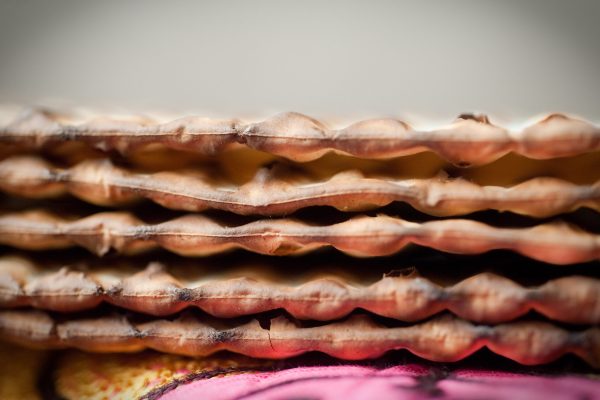Our obligation to teach at the Passover table is not fulfilled until we interpret these symbols: Pesach, matza and maror.
We do not raise or point to the Pesach on our seder plate because it symbolizes a sacrifice that is no longer offered. The Talmud teaches that vegetarians may use a broiled beet instead of a shankbone for the Pesach (Pesachim 114b).
Pesach. The Passover sacrifice.
What does the Pesach teach? On their last night in Egypt Israelite families shared the Passover meal: a roasted lamb, eaten in haste, family by family.
And in each Israelite household were women who sustained family life, who continued to bear children despite Pharaoh’s decree, who created spaces for holiness to enter, even as destruction raged outside.
Matza. The unleavened bread.
Raise the matza and say:
What does the matza teach? The next morning, as God led us out of Egypt, our people fled with “their kneading bowls wrapped in their cloaks around their shoulders.” (Ex. 12:34). In the wilderness, they baked the dough prepared in bondage into hard, unleavened cakes – the bread of freedom.
And in each Israelite household were women who met extraordinary circumstances with calm practicality, preparing food for the journey ahead. In this matza, we see a daily chore transformed.
Maror. The bitter herb.
Raise the maror and say:
What does the maror teach? Bitter vegetables remind us of the harsh taste of servitude. But why talk of slavery when we’ve just now glimpsed freedom? Our tradition teaches that only those who long for freedom fully know the bitterness of slavery. Only those who refuse to be defeated by bitterness will realize freedom.
And so we honor women who refused to submit. Yocheved risked her son’s life to save him. And the young slave, Miriam, spoke up to royalty to ensure her people’s future. We recall countless, nameless Jewish women throughout history who overcame the bitterness of persecution and prevailed, armed only with faith, courage and love.
All:
In upheaval and dislocation – the courage of daily resolve.
And, in defiance of bitterness – the root and leaf of hope.
From Journey to Freedom, Ma’yan, April, 1995.










